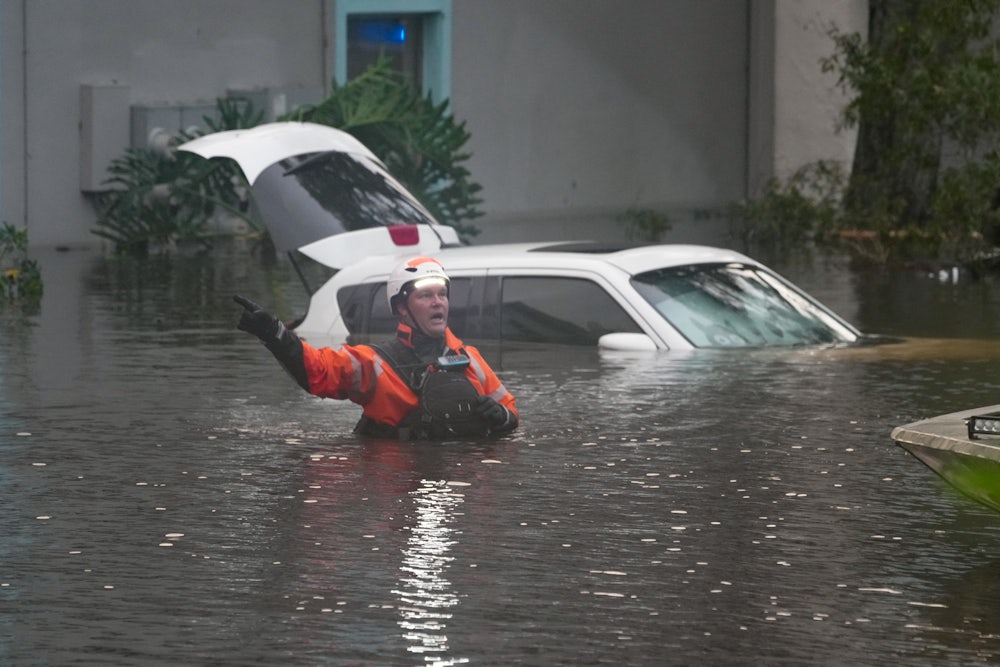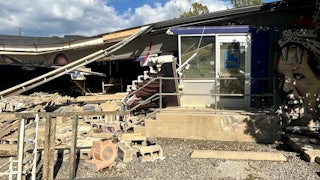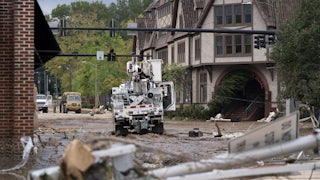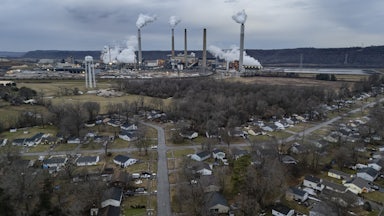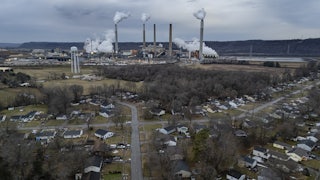Nobody mentioned the home insurance crisis during the vice presidential debate on October 1. It was an especially striking omission because Hurricane Helene, one of the most destructive and deadliest hurricanes in U.S. history, had just wiped out entire towns in western North Carolina. As people continue to evaluate the full scope of Helene’s damage, Hurricane Milton—another storm intensified by the fossil fuel–driven climate crisis—hit Florida late Wednesday night, unleashing more climate hell in the Southeast.
To his credit, Tim Walz did condemn Trump on the debate stage for joking that climate change will “make more beachfront property to be able to invest in.” And this week, Kamala Harris denounced Trump for telling dangerous lies about immigrants and FEMA in the wake of Helene.
But Harris, Walz, and the Democratic Party’s messaging apparatus are largely missing an opportunity to connect the dots between the climate emergency and rising insurance and housing costs. Democrats should be telling a compelling story about the escalating and deeply intertwined climate, housing, and insurance crises that might resonate with voters of all stripes.
The story that team Harris should be shouting from the rooftops from now until Election Day goes something like this: Pollution-turbocharged catastrophes will level our cities and towns with mounting frequency and ferocity until we stop burning fossil fuels (and they’ll continue for years afterward because of high atmospheric concentrations of greenhouse gases). The green economic investments in the Inflation Reduction Act are a downpayment toward decreasing the likelihood and severity of extreme weather, but there’s much more we must do to reduce disaster risks and make post-disaster responses and recoveries more equitable.
Meanwhile, big insurance companies are raising premiums or withdrawing coverage altogether in communities across the United States—abandoning longtime consumers while continuing to invest in, and profit from, fossil fuel projects that increase the chances of future calamities. As insurers—keen to privatize gains and socialize losses—curtail the availability and affordability of home insurance, it’s becoming more difficult for aspiring homeowners to pay off mortgages and for affordable housing developers to finance and operate rental properties. More and more neighborhoods are likely to be deemed uninsurable—and eventually unmortgageable—in the coming years, meaning that a significant amount of the nation’s real estate is currently overvalued by hundreds of billions of dollars. There’s a growing possibility that local housing market crashes will cascade through the financial system, jeopardizing global economic stability. As with the foreclosure crisis that was caused by predatory subprime lending, tax revenues in affected municipalities would decline, thus setting the stage for another devastating round of austerity.
Halting this worsening crisis is possible, Harris and Walz should emphasize, but only if we ditch the untenable status quo. Republicans have proven themselves hostile to addressing the tangible problems facing Americans—as evidenced, for example, by Project 2025’s proposals to gut disaster planning, relief, and recovery efforts. The GOP’s fossil fuel boosterism, refusal to invest in preventive infrastructure, and further deregulation of home insurance markets only heighten susceptibility to disasters and exacerbate their consequences. A dozen years ago, North Carolina’s Republican-led legislature passed a law that prohibited policymakers’ use of sea-level rise projections and mandated the use of historical data in a rapidly changing world. Last year, the same legislature passed a law that hindered the modernization of residential building codes and reduced funding available for climate resilience, locking homebuyers into more exposed housing while driving up insurance costs. In Florida, the GOP-controlled state legislature passed a law—pushed by Governor Ron DeSantis after he raked in millions of dollars from the insurance industry—that makes it harder for homeowners to sue insurers for acting in bad faith.
There is no such thing as a purely “natural disaster.” Disasters always reflect the interaction between naturally occurring hazardous forces (though even those are now typically supercharged by global warming) and socially produced patterns of injustice and vulnerability. Moreover, there is no such thing as a “climate haven.” The recently leveled city of Asheville, North Carolina, was marketed as a safe place that people in coastal areas should move to. The widespread lack of flood insurance there is a market failure enabled by lawmakers who allow insurers to disaggregate hazards into discrete categories with different coverages rather than requiring them to properly pool risks and provide comprehensive, all-peril policies (or creating a public program that does so).
Harris’s message should be that Democrats recognize that the climate emergency is a cost-of-living crisis that affects all of us, albeit unequally; that her administration is committed to pursuing egalitarian and sustainable solutions, from massive investments in green social housing, green transit, and green energy to the provision of public disaster insurance. The only thing Trump, JD Vance, and the MAGA movement have to offer is the dystopian politics of the “armed lifeboat.”
Crafting a narrative is one thing; governing is another. If Harris wins the election, her administration must use the president’s bully pulpit to demand a whole-of-government response to the multidimensional climate-housing-insurance crisis. That won’t be easy: Policies we desperately need, like a publicly managed fossil fuel phaseout and a federal reinsurance facility to reduce insurers’ overreliance on the unregulated global reinsurance market, aren’t something the executive branch can do alone. Adequate cooperation from federal lawmakers and the courts would hinge on Democrats gaining control of Congress, abolishing the filibuster, and taking steps to rein in our judicial overlords. Meanwhile, an obscure 1945 law called McCarran-Ferguson—long overdue for repeal—keeps the insurance industry mostly regulated at the state level.
But there are three practical steps a Harris White House could take immediately to get the ball moving in the right direction.
First, the Financial Stability Oversight Council ought to designate major insurance companies as systemically important financial institutions, or SIFIs, which would subject them to supervision by the Federal Reserve (underscoring the importance of picking a Fed chair who takes financial regulation seriously). That’s probably the quickest way to assert greater federal oversight over the insurance industry.
Notably, the Oversight Council used the statutory power granted to it by the 2010 Dodd-Frank law to designate AIG, MetLife, and Prudential as SIFIs during the Obama administration, but the three insurance giants were able to shed that label through a combination of legal challenges and Trump-era deregulation. Treasury Secretary Janet Yellen, chair of the Oversight Council, took more than two years to begin rescinding the Trump administration’s assault on the SIFI designation process, but the panel last November finalized a new framework to supervise systemically important nonbanks. A Harris administration should make swift use of this key regulatory tool.
Second, the Treasury’s Federal Insurance Office ought to establish a comprehensive and publicly accessible national database to monitor insurance market changes. The lack of such a database has left the public in the dark—information about today’s insurance trends is even more scarce than what regulators knew about mortgage lending before the 2008 financial crisis. Two years ago, the Federal Insurance Office proposed a robust data collection process. However, the National Association of Insurance Commissioners, or NAIC, an industry-funded trade group that defends the existing system of state-led insurance oversight while setting minimal standards for state-level regulators, cried foul and later announced its plan to issue a separate data call. Even though the Office of Management and Budget had already approved a watered-down Federal Insurance Office proposal, enabling the Treasury office to proceed unilaterally, FIO and the trade group NAIC agreed in March 2024 to move forward with a joint data-collection process.
Almost immediately, it was reported that insurance commissioners in multiple Republican-led jurisdictions—including the particularly high-risk states of Florida, Louisiana, and Texas—intended to limit or forgo participation, vindicating advocates’ warnings about the pitfalls of a NAIC-led data collection system. The NAIC hasn’t committed to making data available at the zip code or census tract level, even though the latter is what’s required to precisely analyze climate risks and unfair discrimination. Fortunately, FIO can still use its subpoena authority to create a public database of insurance patterns akin to the mortgage-lending database maintained by the Consumer Financial Protection Bureau. This ought to be one of the first steps taken by a Harris administration.
Third, a Harris administration should make it a priority to establish a National Catastrophic Modeling platform, as proposed last December by the Biden administration. Right now, private insurers justify coverage changes and premium increases based on information gleaned from proprietary, black-box catastrophe models, which generates concerns about potential conflicts of interest, discrimination, and price gouging. The creation of public catastrophe models can increase transparency while also facilitating more democratic decision-making about local adaptation as well as government-supported retreat, where appropriate.
Alarmingly, the Trump-aligned Project 2025 seeks to dismantle the National Atmospheric and Oceanic Administration and its suboffices, calling for a “review” of the National Hurricane Center’s work and urging the National Weather Service to “fully commercialize its forecasting operations.” In response, Harris should defend the principle that weather forecasts and climate risk data are public goods and ought to be provided as such. Especially in the wake of Helene’s devastation of Appalachia, where reliance on outdated flood maps made things worse, the federal government must bolster its efforts to accurately and effectively communicate climate risks to the public.
These concrete steps are relatively small, but they’re vital to generating momentum for further intervention at the federal and state levels. Ultimately, executive action by itself cannot solve an issue as intractable as the interlinked climate-housing-insurance crisis. Whatever Harris and Walz are able to accomplish from a policy standpoint, they must supplement that with repeated demands for complementary legislative action and reforms to prevent right-wing jurists from repealing progress.
That ought to start now. Although Harris and Walz don’t yet have the power to do everything outlined above, they do have an opportunity to seize the narrative and convince people that the Democratic Party has a plan to help them weather the coming storms. Doing so could help Harris win the election itself.
